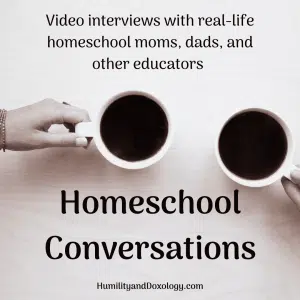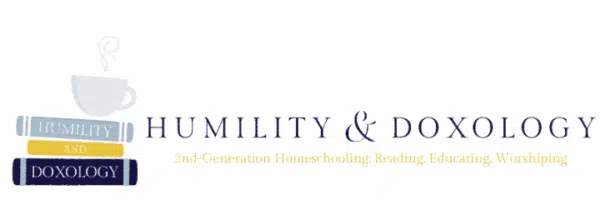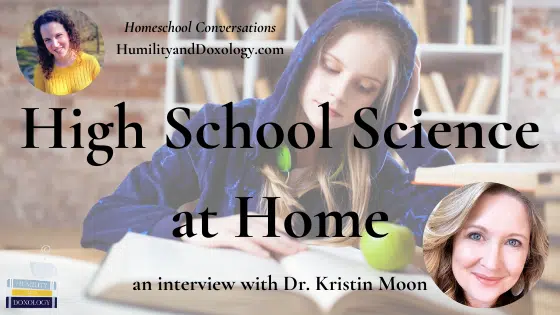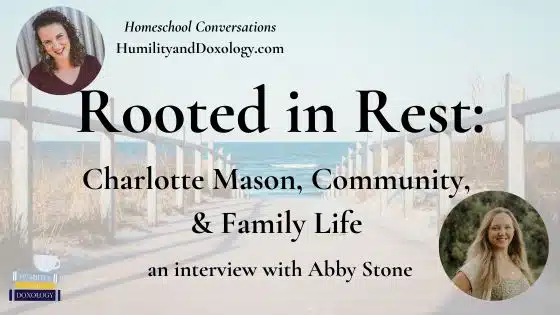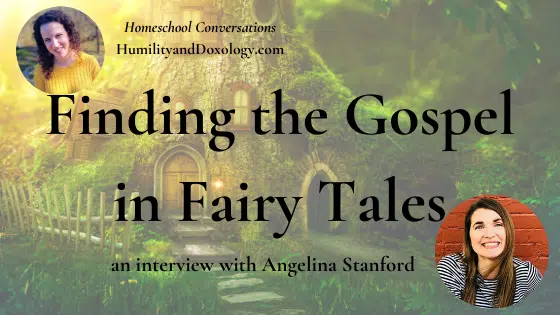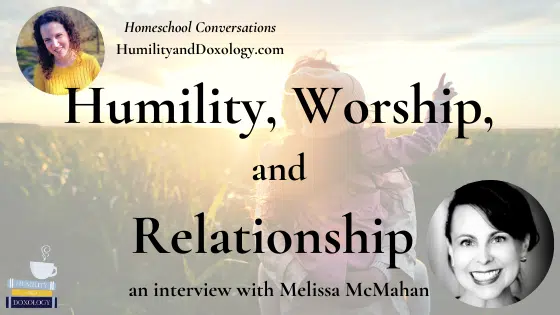It’s our first repeat guest on Homeschool Conversations, and I think you’re going to quickly see why I invited my friend Dr. Kristin Moon back on the podcast! Kristin combines a passion for science with real-life experience as a homeschool mom in the trenches. She brings an attitude of wonder and delight to every discussion about science. Because of her years teaching science to homeschoolers, she has lots of great wisdom to share in this episode specifically about preparing for and succeeding in high school level science courses. Yes: You can homeschool high school science successfully!
Be sure to check out all the other interviews in our Homeschool Conversations series!
Watch the video. Listen to the podcast. Read the show notes. Share with your friends!

{This post contains paid links. Please see disclaimer.}
Who is Dr. Kristin Moon?
Dr. Kristin Moon has a Bachelor’s degree in Microbiology and a PhD in Molecular Genetics. After graduate school she worked briefly in research designing a viral delivery system for therapies directing drug delivery for patients losing their sight due to macular degeneration. It was during her time in the lab that she discovered her affinity for teaching. Kristin homeschooled her 2 sons through high school graduation and continues to teach science to other students both in person and online in ways that are fun, memorable, and easy to understand. Kristin writes and teaches online at KristinMoonScience.com, and her Facebook page is one of my favorites to follow.
Kristin also teaches at FundaFunda Academy and at True North Academy.
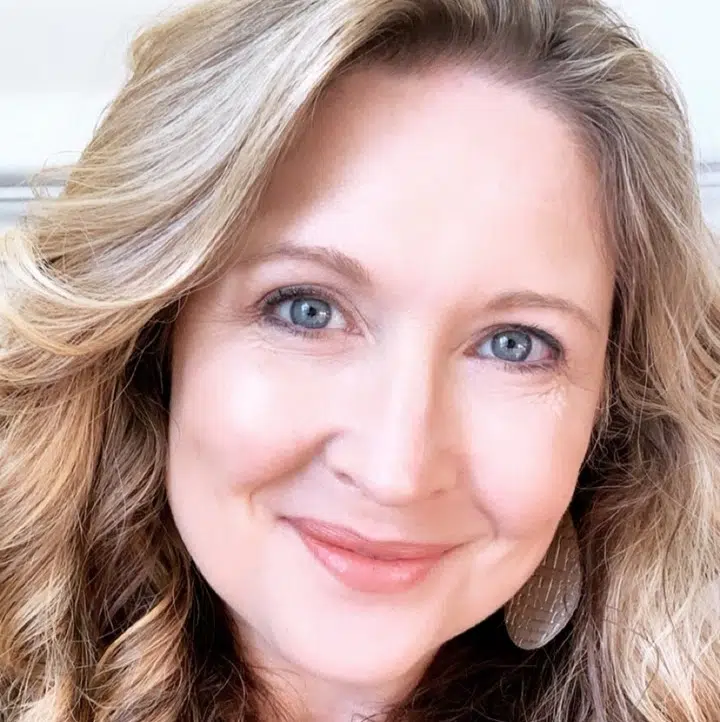
Watch my conversation with Dr. Kristin Moon
Prefer to listen to your content? Subscribe to Homeschool Conversations on Apple podcasts or wherever you get your podcasts so you don’t miss a single episode!
Amy Sloan: Hello, friends. Today, I am joined by my friend, Dr. Kristin Moon, who is actually a repeat guest on homeschool conversations. I am so glad to have you here with us today.
Dr. Kristin Moon: Thank you.
Amy: Well, Kristin has a bachelor’s degree in microbiology, and a PhD in molecular genetics. After graduate school, she worked briefly in research designing a viral delivery system for therapies, directing drug delivery for patients losing their sight due to macular degeneration. It was during her time there in the lab that she really discovered her affinity for teaching.
Kristin homeschooled her own two sons through high school graduation, and continues to teach science to other students, both in person and online in ways that are fun, memorable, and easy to understand. Actually, my own son is taking one of your classes this year and really enjoying it. He’s a joy to have him in class. Thank you.
Kristin writes and teaches online kristinmoonscience.com.
Today, we are going to be talking about a question that I think comes up a lot, especially as parents look towards those high school years, am I going to be able to teach high school science? Does it matter? How do I prepare my students for those harder classes?
Before we get to those questions, can you just tell us a little bit about yourself and your family and your experience homeschooling and your background as a scientist?
Dr. Kristin: Sure. My background as a scientist: I had a public education all throughout school, and went to college not thinking I was going to be a scientist. I did not know that I liked that until I took a general education class in my first semester. It was biology, and they were talking about DNA and viruses, and it was honestly the first time it had ever been presented to me in that way. That was it. I was hooked, and I changed my major from broadcast journalism to microbiology, and then went on and got my PhD and just absolutely had a ball with it. My degrees prepared me to do lab research, and that’s what I assumed I would be doing.
Then I had my first son, and I just could not stand to be away from him. I tried it for five months. I would get up so, so early while it was still nighttime, drive to the lab, try to get some work done and come back. It was very complicated childcare, but I just missed him so much. I realized that despite all the people that told me that I was wasting my education by going to be a stay-at-home mom, I didn’t care. That’s where my heart’s desire was. That truly was the best thing I’ve ever done. I absolutely adored staying at home with my boys. When it was time for school, I decided to keep them home because by then I had heard about homeschooling, and we just had a blast. We had a blast learning together. I loved being there to watch them learn new things. They had struggles along the way, we worked through them, and it deepened our relationship.
Did I answer all the questions? I don’t know. Sometimes I start talking and it’s like a stream of consciousness and then I’m like, “Did I answer the question?” [chuckles]
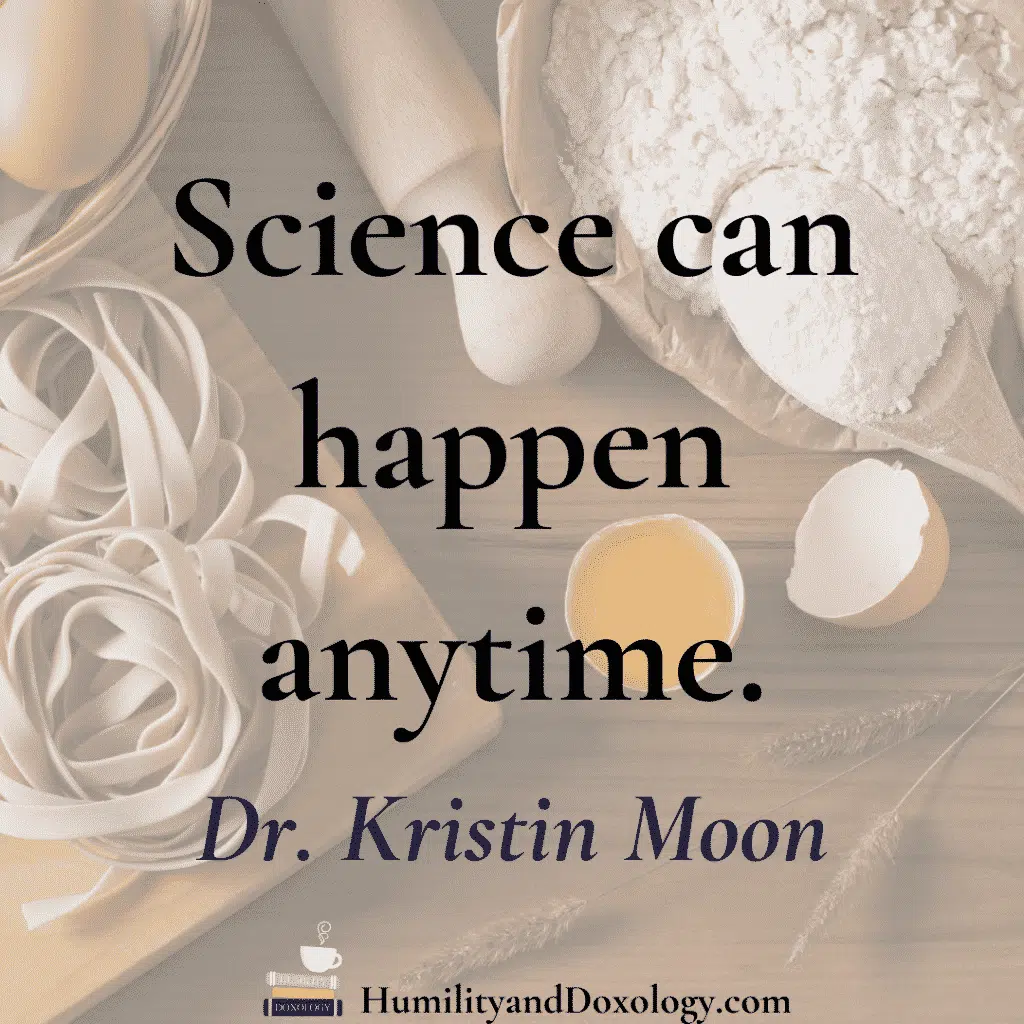
Concerns about homeschooling high school science
Amy: I love it. Now, stream of consciousness is like part of the whole flair here in Homeschool Conversations. Well, over the years, you’ve taught a lot of homeschool science classes, like I mentioned earlier, in person and online. I was wondering if you’ve noticed any common questions or concerns that parents have had, especially as they’ve approached those higher level science classes.
Dr. Kristin: I don’t know if it’s a question per se, but what I have noticed, what I noticed very early on, even when my own sons were preschool and kindergarten age, the reason I got into teaching science in homeschool co-ops and science clubs and all of this, was because I’ve heard time and time again how much parents are intimidated by high school science. Because that’s what I just absolutely loved to teach and talk about, I would always step into the void to help teach these subjects in co-ops and stuff. A lot of times, parents think that they’re not going to be able to handle teaching homeschool science. In my experience, that sometimes will drive people to put their children back into traditional school because they feel like, “I’m not going to be able to provide an adequate science education, and I’m going to fail my kids. I might as well put them in traditional school.”
What I would tell parents, and what I do tell parents, is you don’t have to feel that way. If you don’t remember mitosis or how to balance a chemical equation, it’s okay. First of all, there are really great homeschool curriculum available to help your student work through it. Some of the books are directed in a very conversational way so that your student can just pick up the book and read it and figure it out on their own. There’s so much technology, it’s changing every day.
If you’re feeling very insecure, there are always online classes. There are online tutorings. There are amazing, absolutely amazing content creators on YouTube. You could just get on YouTube. I could suggest different accounts to follow for the different subjects, and they will explain the different concepts in the subjects in a way that’s very easy to understand.
You don’t have to know it all. If you feel like you have to know it all, then you might have some problems, but it’s okay. I’ve been teaching science for years and years and years, I’m still learning. There’s still so much to learn. I think that you have to get rid of the misconception that you have to have it all together, that you have to know everything. You need to model for your children that it’s a lifestyle of learning. I know that that’s what you believe. You’re always learning. It doesn’t stop when you graduate high school. If you don’t know something, be honest about it, and then model for your kids seeking to find the answers to your questions.
Amy: Oh, I love that. Yes, lifelong learning and exploring with your children is something that I just love. It’s so important, I think, and it’s one of the most fun parts about homeschooling.
Dr. Kristin: The great thing is, and I have to share this because I know you don’t have any homeschool graduates yet, but I have two homeschool graduates. I have to tell you that I started to get so sad as I saw the end coming. I’m like, “This has been so much fun. What am I going to do with my life when I’m no longer a homeschool mom?” They come home now from their classes. My one son, he doesn’t live with us, he comes home for the weekends, and he’s in engineering school. He wants to share with me what he’s learned. It’s like all these years I’ve been teaching them, and now they’re learning something that I don’t know, and then they come home and tell me. It’s different, but it is amazing. Even when I don’t necessarily understand what on earth he’s talking about when he’s talking about, I love that he wants to share that with me. That’s the thing, that’s the relationship that you build when you’re homeschooling with your kids.
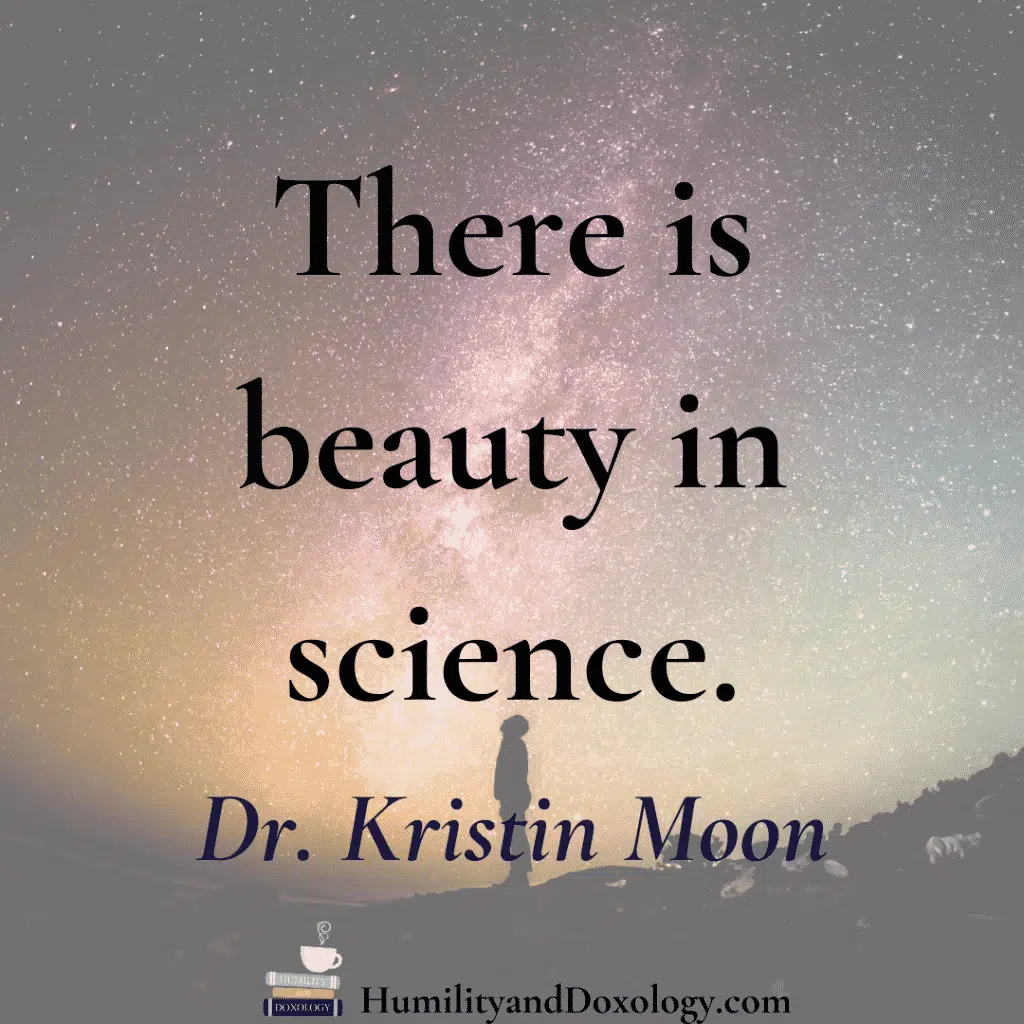
Preparing for High School Science starts before High School
Amy: That gets me so excited. Well, when we’re thinking about high school science, I know that preparing for those more challenging sciences and really laying that foundation starts well before ninth grade. Are there any skills that we need to be focusing on in the earlier years, or maybe even especially in those middle school years to set our students up for success in the high school sciences?
Dr. Kristin: One thing that I would say, and I probably should start taking notes because I feel a stream of consciousness coming on, I have a bunch of things I want to say, and I’ll probably forget to say them. One thing that I wanted to say is, as a science teacher in high school, I would love it if students come into high school, having already a little bit of background about cells or something like that. You don’t have to wait until high school biology to learn about cells, or to learn what an atom is. They can learn it in a very basic level so that it’s almost like a spiral approach.
You might bring up certain topics in a very basic way in the younger years, and then maybe learn it a little bit deeper level in middle school. Then by high school, you’re really ready to dive in. It’s not the first time you’re hearing about what a mitochondria is, or something like that. That’s one thing. I wouldn’t even say that that’s the most important thing.

The most important thing, I think I would say, that you can do to be preparing your kids for high school, is to teach them how to teach themselves. To teach them if they have a question, don’t just stop with the question. Don’t just think, “I wonder why. I guess I’ll never know.”
Teach them how to find the answers that they seek, teach them what it means to research. That could be, if they have a question, show them how to look something up in a library, show them how to look something up in an encyclopedia. I know that encyclopedias are pretty outdated, but I’m talking more like the Usborne encyclopedias of science and that kind of thing. Looking things up on the internet. If they can learn to pursue their answers to the questions that they have, that is amazing, because that is being a self-directed learner, and that’s going to come so in handy all throughout their lives.
What else did I want to say? 100%, I would say to make sure they have a solid math background, because not so much for biology, but for physics, physical science and chemistry, there are some math skills that your students are going to need to know in order to succeed in those classes.
I would look ahead. Probably as your students coming close to high school, you probably will map out a four-year plan. If you know what your state’s requirements are for graduation, you’re going to want to know how many credits in language, and how many credits in social studies, and how many credits in science they’re going to need.

Go ahead and get a rough map of that out. Then when you get to your sciences, check to see if there are any math requirements prerequisites in order to take those classes. Because for chemistry, I’m just going to say, your students really should have already taken Algebra 1 because they’re going to have to have some familiarity with exponent rules and manipulating equations. If you’re trying to get your kid to take chemistry in ninth grade but they haven’t had Algebra yet, they’re going to struggle.
Just look ahead. It’s nothing to stress out about. It’s just looking into the future, getting this rough map and then make sure that they have the math prerequisites before the science courses that they’re going to take.
I would also say I love it when families have tools at their disposal for investigating different things, like a little mass scale or magnifying glasses, microscopes are wonderful, but just the tools at their disposal so that if they have a question, if they have something they want to investigate, that they can do that. A lot of times, kids in high school, they tend to get a little bit envious of their friends that are in traditional school and they get to use all the lab equipment and stuff. You don’t have to feel that way. There are companies that you can buy lab equipment and chemicals and dissection specimens and all kinds of neat things so that your kids can have those lab experiences at home. Those are great experiences for them to have. It’s not even as expensive as you would think.

Amy: Not at all.
Kristin: I think for a long time, I just avoided it because I was like, “Oh, well, that sounds really expensive.” There are some really affordable options.
Amy: Absolutely. One of the big things I’ve been trying to do this year is just say “YES” more. I have a couple of children who just will be reading a book, and it’ll give an example of an experiment or a demonstration or something like that. They’d be like, “Oh, can I do this project?” Before I would often say, “no,” because I felt like, Oh, I’m going to have to go help you set it up and then we’re going to have to have some deep conversation about it. It just didn’t feel like it was ever at a very convenient time. I’d always just say no. This year, I’ve just been saying yes, and I’ve been letting them do it themselves.
I knew that I couldn’t necessarily stop everything and go have a long conversation with them and guide them through the experiment or whatever, but they wanted to do it. They had the book there, we had the materials, and so they’ve just done it on their own, and they’ve loved it. Earlier this week, we had a little volcano exploding in our kitchen, and, oh, the kids just thought this was the coolest thing ever because Mom never lets us make messes.
Kristin: See, it’s those kinds of experiences, and they’re going to look back on their childhood and think, “We had an awesome education,” and it’s building relationships all among yourselves. You’re having fun together and you’re learning together and you’re exploring together. I love it when families have some little science tools stash. It could be just like a little, I’ve told you this before, it could be just this little plastic bin, and that maybe they have their own box of baking soda and magnifying glasses and little cups and measuring tools that you don’t mind them messing with. They’re not getting your nice things that you use to bake dinner with or something like that, but they have their own things.
Then a real cheap plastic or vinyl table class for covering tables. I love it when parents have something like that so that when your student is looking through a book and they come up with this experiment and they want to try it, you don’t have to make a trip to the store, because oftentimes that’s what keeps kids from doing the science experiments, because it’s too much of a hassle to go get the stuff. If you’ve got a little stash of stuff at the ready for them to explore, or they’re going to go outside on a nature trip and they take their little tools and their magnifying glass to look at the things, or a little jar to keep something that they find, that’s wonderful.
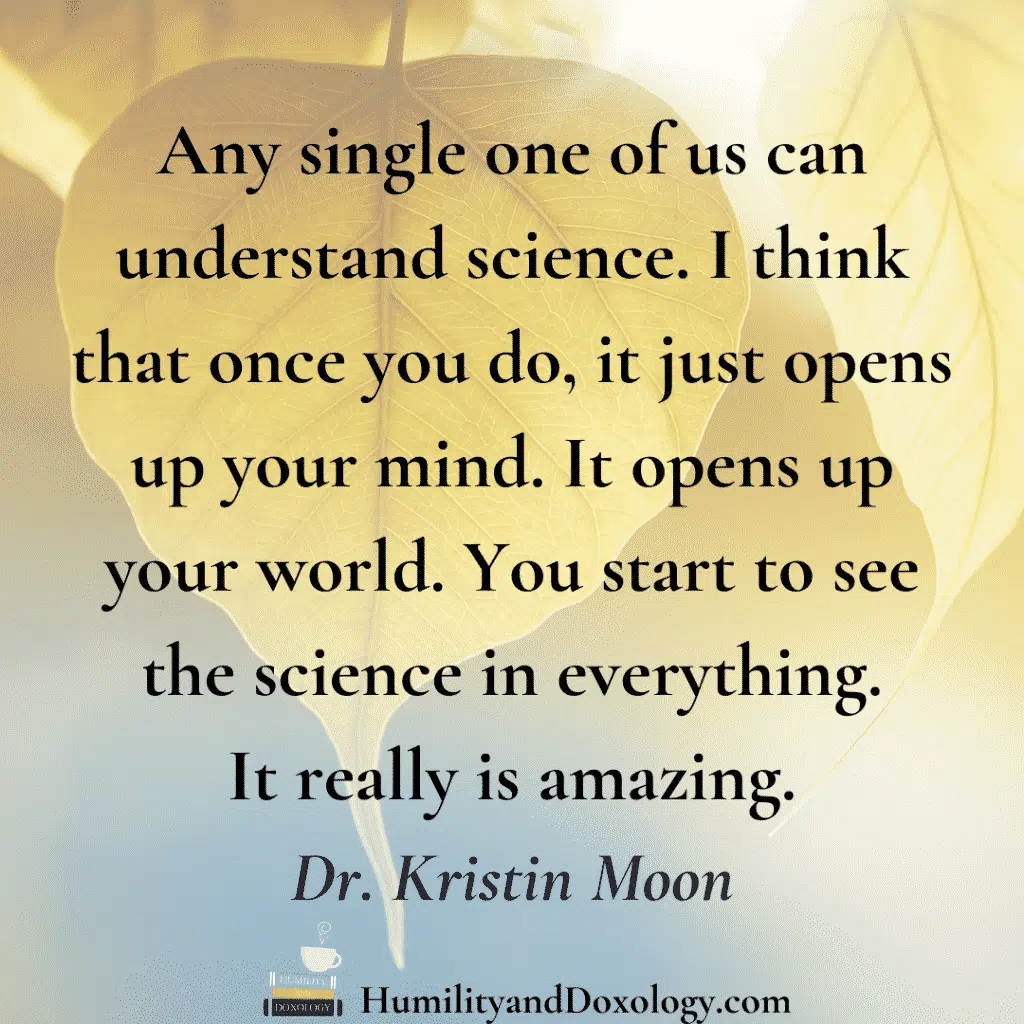
It really helps them understand that science can happen anytime, and there’s science all around us in all of our life. I love the example that you’re doing with your daughter when you let her design her own chemistry in the kitchen class. I love that idea. I love it. I was just talking about that with someone the other day. It’s amazing, and that is chemistry. I love that she’s finding that out. That’s just a great example of finding the science in the everyday life. It doesn’t have to be something set aside and only for scientists. It’s something that we all use. We just need to recognize it.
Is it too late to get prepared for high school science?
Amy: Definitely. You talked about the importance of having maybe a little bit of exposure to some of these science ideas, to have a curious mind, and that really vital importance of having a solid math foundation as you’re preparing your students for high school math. What if a mom is listening and she already has a student maybe in high school and she’s thinking, “Oh no, it’s too late.” Are there any maybe strategies for a crash prep course, like in the summer or something to get that student ready for that high school biology, chemistry, physics?
Kristin: I don’t think it would be ever too late, but there are absolutely ways that you could do a crash course. In fact, I have one of my students last year in one of the courses I was teaching decided she wanted to knock chemistry out over the summer, and it took a little longer than just the summer, but she put the time in, and we would meet online a day or two a week, and I would teach her and then she would do the homework and she would watch the videos.
It can be done. It really can if you’ve got the discipline to make use of the summer months or the weekends. There are places like Khan Academy that are really great. They’ve got whole courses with videos and practice problems. It’s not live online, but if you’re struggling with one of their problems, you can make a comment and they’ll get back to you. It’s really great.
There are ways that you can bridge the gap, if there is a gap. There’s always tutoring. You can meet with somebody in person or you can do it virtually. I come back to the videos a lot, but I have really been blown away with the quality of the teaching that you can find for free on YouTube. I really have been.
Amy: If maybe you can share some of your favorite YouTube channels, or if you have a playlist, and I’ll include that in the show notes when I get that comment.
Kristin: Yes.
Different ways to approach high school science for the STEM-minded and non-science teen
Amy: All right. Does it matter if our child or a student is not like a science kid, when we’re thinking about those high school credits? Now, why should we still care about high school science? Is there any way in which our approach to their math or science education might be a little different from the way we would approach it with a high school student who’s really into the STEM disciplines?
Kristin: Let me answer the second part of that first. If you have a student and you know that they want to go into science, for sure stay on top of the math. My boys both took advantage of dual enrollment, and taking classes through the local college while they were still in high school, but we did opt to have them take their science courses that way. I wanted them to take science first at the high school level and not take it for the first time in college. That was a very wise decision because– Both of my sons now have taken Chem 1, and my younger son has taken Biology 1 in college. If this was the first time he was being exposed to this, it’s going at a very fast pace. They assume that you’ve already had this once before. If you’re learning about cell division for the first time in a college class, it’s going to be intense, and the same thing with Chemistry, the same thing with Physics.
Even though we want our kids to get ahead, I still would make sure they have a solid foundation in the high school science before you try to then let them take it at the college level.
If you don’t think that your child is STEM-minded, I always say that there’s really a benefit to having some basic understanding of biology and chemistry. Biology is our life. To understand our relationship with plants and animals and the world in each other, I think that that is worth the time.
Chemistry, I get that chemistry is one of the harder sciences, but I still think that it’s important to have a basic foundation. Maybe you don’t have to make a super rigorous class, but they should be familiar with the periodic table and what an element is and how different elements can combine. Then the other thing that I say when people ask me that, because I’ve had parents say, “Well, my kid’s not going to go into science. I don’t need to do that.”
I’ve also witnessed personally, and it’s sad, I’ve witnessed families who say that about their student, and then the student hasn’t experience like I did, where they go to college and maybe they think they’re going to go into the arts or broadcast journalism like I did. Then they find out that, “Oh my goodness, I actually really like science.” If they don’t have that background, then it is really hard to catch up once high school is over. It can be done. It absolutely can be done, but I always just like to say, prepare your students for whatever they might want to do, because we know adults who have changed their careers midlife. I just think that we do our students a disservice when we don’t prepare them well for whatever they might choose to do.
I do think that it’s important, even if you really don’t think that your student’s going to go into science, give them at least some foundation. At the bare minimum, you are exposing them to the wonder of the world. Science really is, I know that we talk about it as if it is something that we can’t understand, but really, and truly anything that you can think about is science, the weather, baking. It’s very nice to have some foundational understanding. I find great beauty in it. I just think that it makes for a much more well-rounded individual to have at least some background in science.
Amy: I love what you said about just making sure we have those options for our students and not closing off potential areas of surprised interests later on too soon. Also, I think just, maybe it’s like a modern thing where we look for the usefulness, “Well, when am I going to use this?” That kind of utilitarian idea. Especially from my perspective as a classical educator, I think this is true for anyone seeing the value and the beauty of something that’s wonderful, that just exists in itself because of how it points us to our Creator and to the way the world works, and just, it’s beautiful.
We don’t have to think, “Well, I don’t really use pre-calculus or trigonometry as a homeschool mom except in helping my students.” It’s not like I use that on a day-to-day basis, but oh, it was so much fun to learn and see the way the mathematical formulas and equations can be manipulated! Same with science, just to be filled with that wonder as you approach it, there is value in that, whether you’re going into a science career or not.

Dr. Kristin: Honestly, there is beauty. There is beauty in science. When your student takes chemistry and they actually understand how the periodic table is put together and the organization of the universe, I don’t know how someone cannot be amazed. I could say the same thing when you’re studying biology, when you’re studying the mechanisms of the way your cells work, or anatomy and physiology. When you talk about how a nerve impulse passes through your body, it is amazing. It makes us understand that inside our head, we’ve got all of these thoughts and we think that we’re so important, but there are things that are happening in our own body that we’re not aware of and we don’t have control of, but it works. I really do find such beauty, and I’m constantly amazed, and it’s a source of joy for me every time I learned something new in science. Anyway, stream of consciousness again.
Amy: This is one of the reasons why I have loved getting to know you because you just ooze that joy about science on your Facebook or just when I talk to you. It’s just, “Oh, this is so exciting.” It’s contagious to have that kind of attitude.
Dr. Kristin: Here’s the thing. This is another thing I want to say. I didn’t have that when I was in high school. That is a whole part of me that I didn’t even tap into until I got to college. That’s another reason that I’m really passionate about what I do, and teaching science to high schoolers and to middle schoolers and elementary schoolers. Because I would love it if I could get kids excited about science before they get to college so that they can use this time, like what we’re talking about this time in high school to prepare for what’s coming down the road.
There are so many incredible careers available that weren’t even available when I was in college, diseases that exist. Scientists are coming up with cures and treatments for diseases like sickle cell anemia which there is no treatment for other than managing pain. They’re coming up with cures for this and cancer and all of these different things. It’s amazing, and I really do get joy when one of my students says, “I was going to do this, but now I really loved your class and I’m going to go and pursue a career in microbiology or medicine or something else.” I’m like, “Yes, I’m so glad that you found out that science isn’t something set aside for only a select few.”
Any single one of us can understand science. I think that once you do, it just opens up your mind. It opens up your world, you start to see the science and everything. It really is amazing.
Amy: I hope that that is going to be a real encouragement to the homeschool moms who are listening, who maybe have been a little intimidated thinking about the high school science time with their students. I hope this has been a real encouragement to them. I know it will be. Well, as we close, I wanted to ask you the two questions that I’m asking all of my guests this season. The first question is just, what are you reading lately?
What Kristin Moon is reading lately
Dr. Kristin: I’m teaching a new class to me this year, and that’s anatomy and physiology. A lot of the books that I’m reading this year are related to the human body. I know that probably doesn’t appeal to most people, but one book that I really really enjoyed was by Bill Bryson, who actually has written many different books about different things, but he wrote one about the body. It’s called The Body: A Guide for Occupants, and it is delightful. I love the way he writes. It’s very interesting.
That was one book that I really liked, but now I’ve moved on to a new author. Her name is Mary Roach. The book that I just started last night is called Gulp, G-U-L-P. It’s about the alimentary canal, the digestive system. I’m just a little bit in. I don’t really know what I think of the book yet, but so far it is interesting.
Amy: I never would have thought of a book on the alimentary canal.
Dr. Kristin: Well, yes, but I’m part of different teachers groups of different teachers that teach anatomy of physiology, and I’ve heard Mary Rouch’s name brought up over and over and over again about her very interesting books. I said, “Well, sure, why not?” I already know that one of the activities I love to do with my middle schoolers is having them take different colors of yarn and measure how big is their mouth, and that’s one color of yarn. How long is their esophagus, that’s a different color of yarn. Then they calculate how long or then their stomach, and that’s a different color of yarn.
Then they figure out, based on their height, how long their small intestine is, and then how long their large intestine is. They tie all the pieces of yarn together and it stretches out. It really is mind-boggling how long our elementary canal is. Then you can compare the different sizes. Like if you have a young child and then you’ve got your older son, comparing the different lengths of digestive systems. I know that might sound silly, but it’s very interesting. Then that can take you into a discussion. Well, why is it so long? Well, what happens in the stomach? What happens in the small intestines? What happens in the large intestine? It’s relevant to each and every one of us.
Amy: We all eat.
Dr. Kristin: Yes, we do. Why do we eat? You really, you could just get off on all of these different explorations.
Amy: I remember when I was being homeschooled, I must have been like in the maybe sixth or seventh grade, maybe fifth, I don’t know, somewhere in there. We were doing a human body study with some other families, and I’ll never forget when we were at our friend’s house and we were learning about the digestive system. We all stood on our hands with our feet propped up against the wall, and we were all, while we’re upside down, given a raisin to eat. We ate the raisin, and lo and behold, it is not gravity that is bringing your food down your esophagus to your stomach. We saw how you can actually eat and the raisin travels down through your body.
Dr. Kristin: That’s really neat.
Amy: Yes, that was a really fun thing. I still remember that. I haven’t thought of that in a while. [laughs] I don’t know if we would feed raisins to upside-down children now, but I probably would.
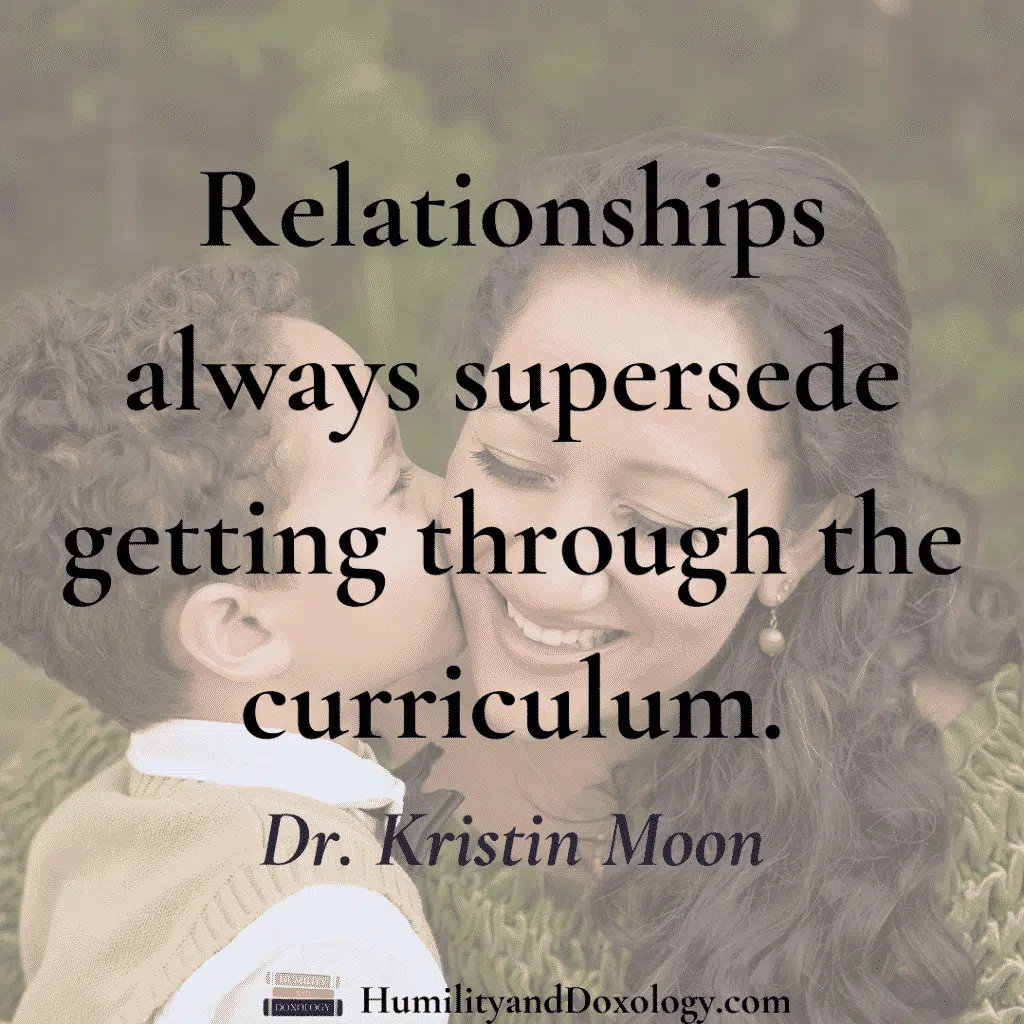
Tips for a Homeschool Day Going Wrong
Well, Kristin, what tips would you give to a homeschool mom whose homeschool day seems to be going all wrong?
Dr. Kristin: I would say, show grace and accept grace. Just grace, just cover the whole thing with grace. There is no shame in when you’re having a really terrible, horrible, no good bad day to just walk away from the books. Relationships always supersede getting through the curriculum. Because if you have a bad attitude, if your student has a bad attitude towards you because you’re having a bad day because words have been exchanged or maybe looks or whatever, they’re going to have a hard time receiving what you’re trying to teach them. It’s probably gonna just be scrapped anyway.
I’m not saying anytime you have a little stumbling block in your day, just to call it quits and go to the park. I think most of us know when we’re having a bad day, and perhaps you need to just call a time out. It’s okay because you just need to keep that relationship good. You need to keep it strong. If that means you’re going to climb under some covers and watch a movie or go to the park, take a nature walk, just do something to salvage the day.
Not necessarily calling it school, but just understand that you’re going to have bad days, that it’s a marathon and not a sprint, you’re going to get through it, but ultimately the more important thing is not that you finished the textbook at the end of the year, but that you’ve deepened your relationships, that you’ve worked on character. We didn’t do that too, too often, but it definitely is important, and to also not always wear your teacher hat. It’s okay to sometimes not turn everything into a lesson. That was a problem for me. I’ll just leave it at that.
Amy: The homeschool moms, we’re like, “Oh, this would make a great educational opportunity.” Our kids are like, “We just wanted to have fun with you today.”
Dr. Kristin: Yes. Or going to Costco and then making your kids do the math problem about how many sheets per roll and what’s the best cost. That’s okay every once in a while, but it’s okay to be just mom every once in a while, too. You don’t have to turn everything into a lesson.
Find Kristin Moon Online
Amy: Yes, definitely. Well, Kristin, where can people find you all around the internet?
Dr. Kristin: I was not very inventive with my name. It’s Kristin Moon Science. You can find me Kristin Moon Science on Facebook. I’ve got a website, Instagram and Pinterest. I’m also on YouTube. I haven’t created too many of my own YouTube videos, but I do have playlist for biology, anatomy, and physiology chemistry and physics, physical science. When I find a really good video, I save it to one of those playlists so that if someone they’re teaching biology and they something’s just not clicking for their kids, they can go to my YouTube channel, find the biology playlist, scroll through and hopefully find a really good video that will help them teach their student through that tricky subject.
Amy: Fabulous. I will have all those links up in the show notes for this episode at www.humilityanddoxology.com. I love using YouTube playlist from people that I can trust, because YouTube can be a scary, sketchy place. Especially to send your children off into, so this playlist can be really helpful tools.
Well, thank you so much for joining us today, and I look forward to chatting with you all about science sometime soon.
Dr. Kristin: Thank you.
Check out all the other interviews in my Homeschool Conversations series!
